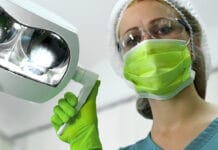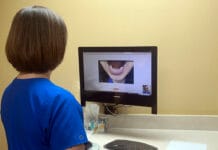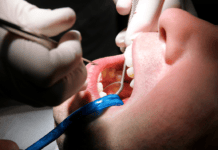Maternal oral health is a determining factor in a child’s risk factor of decay. Many people don’t realize that a mother’s dental practices while pregnant and after the child’s birth can affect a child’s risk of caries as they age.
Non-dental professionals offer advice every single day with mixed results. So, how can we further help our patients really understand how important their dental health truly is? Effectiveness of Preventive Dental Programs Offered to Mothers By Non-Dental Professionals to Control Early Childhood Dental Caries: A Review was written by Ajesh George, Marianna Sousa, et al, and studies the effectiveness of these interventions in mothers and their children.
The term non-dental professionals refers to all other health professionals outside of the dental realm, including teachers, psychologists, OB-GYNs, nurses, and social workers.
Early Childhood Caries
Early childhood caries, or ECC, is the most prevalent worldwide chronic childhood disease even though the damage can easily be prevented with proper education. Ninety percent of children all over the world, including low-income families in the United States, suffer from untreated decaying teeth that impact their lives in the short-term and the long-term.
Pain and discomfort tend to worsen over time. Everyday activities become difficult for the child, such as eating, sleeping, and even growth. Untreated caries can result in hospitalization and even surgery. Various public health initiatives, such as fluoride rinses and varnish programs in school, may not reach the children until it’s too late and decay has set in.
Education on dental hygiene should be consistent and come from all directions to increase the relevance of the subject in our collective common sense. So far, no one has undertaken a study on how effective nurses and doctors can be in supporting dental care in their patients.
Methodology and Goals
Five database searches were done in search of quantitative studies written in English that report on dental interventions by non-dental professionals and their effectiveness on expectant mothers and mothers of toddlers. Nine studies were chosen because they measured the outcomes and changes in the children’s teeth just before the age of five as well, and that of their mothers at the same time.
This study attempts to discover if current oral health programs aimed at mothers are actually helping. If so, which one’s aid both the mother and the child. Are the programs comprehensive enough, or is the general healthcare industry missing any new and valuable information that could help our patients with their dental health and, therefore, our ability to help them in the future?
Results
Young children whose mothers received information and care from a multidisciplinary team of specialists, such as obstetricians, social workers, and nurses, along with dental professionals, had significantly fewer dental caries and fewer extractions than mothers who did not get the information. The effectiveness of the programs directed towards mothers significantly decreased caries in their toddlers. But, in truth, the great start these toddlers receive does not statistically continue on further than that.
At the same time, it was discovered that most of these mothers lacked a fundamental education in dental related issues, even in countries not considered third world. But, even though the statistics aren’t completely supportive, the programs do help certain people and their children who would not normally have access to care. Abandoning any programs due to a lack of statistical support does hurt the mothers and the children in a significant way.
The researchers conducting the study did discover that the dental education shared by non-dental professionals was not cohesive, nor was it completely accurate and omitted relevant details. Access to free dental supplies in lower-income neighborhoods did have a positive impact on these statistics suggesting that the problem is more complicated than imagined. If all the relevant professionals maintained a supply of toothbrushes, paste, mouthwash, and interdental aids, just as our offices do, the statistics suggest that the levels of dental care will increase. It’s all about access.
It’s Really That Simple
When all health and social professionals spread the same useful information in an understandable and relatable way along with complimentary supplies, children in this world can grow up with healthy and pain-free mouths. All professionals, especially in health-related fields, do have an impact on the oral health of a family if increased access to supplies and cohesive and correct information is given. It can be that simple.
Our responsibility as dental professionals is to increase our communication with others in health fields and teach them the importance of correct dental hygiene procedures. This will benefit us, the other professionals, mothers, and all of our future children. We do so well in giving our patients access to this information, but they don’t have to get it all from us. Again, information coming from all sides of the health fields will help bring dental hygiene into the realm of common sense.
Before you leave, check out the Today’s RDH self-study CE courses. All courses are peer-reviewed and non-sponsored to focus solely on high-quality education. Click here now.











